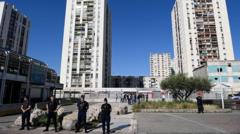Authorities in various French cities, such as Nîmes and Béziers, have taken drastic measures by implementing curfews for minors amid increasing violence associated with drug trafficking. The latest to announce such measures, Nîmes, is responding to a recent wave of violent incidents, including a shocking daylight shooting that resulted in one death and several injuries. The local authorities have noted a particularly severe incident— the discovery of a partially burned body of a 19-year-old on the city's outskirts.
Nîmes Mayor Jean-Paul Fournier underscored the necessity of these curfews, stating that the atmosphere had become “untenable” due to the pervasive influence of drug traffickers creating a “climate of fear and terror.” The curfew, effective from 21:00 to 06:00, aims to shield those under 16 from exposure to violence and criminal exploitation. Deputy Mayor Richard Schieven highlighted the need for protective measures, especially for vulnerable youth, some as young as 12 or 13, who may fall prey to the drug trade.
Meanwhile, Béziers has had a curfew in place for children under 13 since last year, extending it to include those under 15 in specific areas earlier this year. Mayor Robert Ménard pointed out that “No 10-year-old out on the street at 02:00 is up to anything but mischief,” emphasizing the need for sensible regulations for youth amid the growing issues of violence. However, incidents of violence persist, as evidenced by reports of masked youths attacking local police with fireworks over the weekend.
In Limoges, city officials have also implemented curfews; however, recent disturbances involving large groups of youths have raised concerns regarding the efficacy of these measures. Mayor Émile Roger Lombertie remarked that, despite the curfews being announced, law enforcement struggled to intercept the wrongdoers, asserting that more police presence is crucial to enforce compliance.
This trend of violence notably escalated after the tragic killing of a 10-year-old boy in Nîmes, prompting community outrage. Drug-related violence continues to spread beyond the traditionally affected areas like Marseille, contributing to a growing number of casualties. The latest statistics from the interior ministry showed that in 2024 alone, 110 individuals lost their lives, and over 300 others were injured due to drug-related violence throughout France.
In response to this crisis, France's Interior Minister Gérard Darmanin and Justice Minister Bruno Retailleau have prioritized combating the drug trade, advancing legislation that established two high-security prisons for drug kingpins. They have also enhanced powers allocated to investigators and introduced a protected status for informers to encourage cooperation. In recent developments, 17 of the country’s most dangerous drug traffickers have been transferred to a high-security facility in Vendin-le-Vieil, a strategy designed to undermine the influence of these gangs amid a backdrop of retaliatory violence observed in French prisons.




















